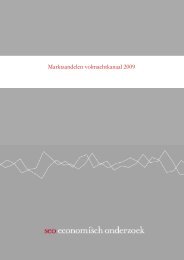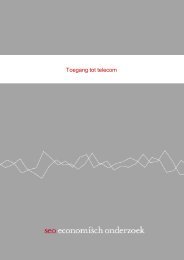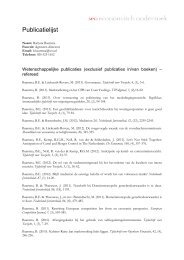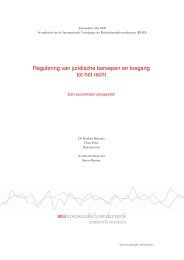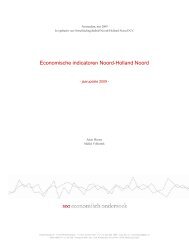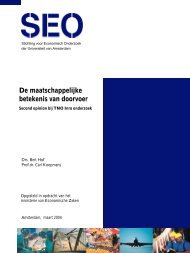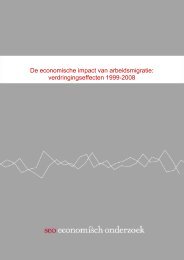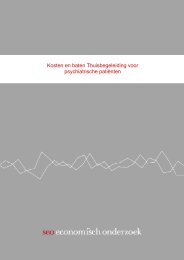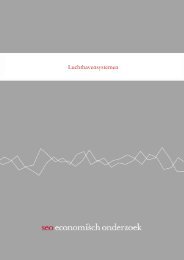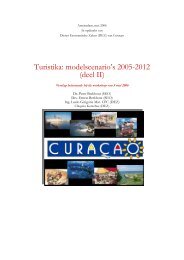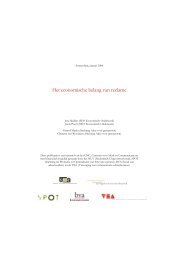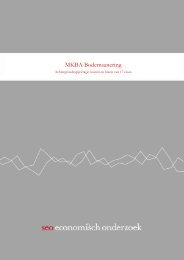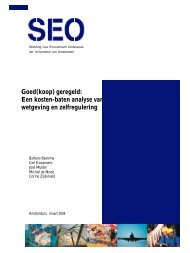Amsterdam, Netherlands - SEO Economisch Onderzoek
Amsterdam, Netherlands - SEO Economisch Onderzoek
Amsterdam, Netherlands - SEO Economisch Onderzoek
You also want an ePaper? Increase the reach of your titles
YUMPU automatically turns print PDFs into web optimized ePapers that Google loves.
4.4.1.2 Recruitment of foreign studentsAll <strong>Amsterdam</strong> HEIs have incorporated further institutionalization as an important ambition intheir strategic agendas. The strong reputation of <strong>Amsterdam</strong> abroad gives HEIs in this region acompetitive edge against other <strong>Netherlands</strong> institutions in recruiting international students. UvAand VU have a comprehensive curriculum of English taught Master programmes. UvA’sambition is to recruit 25% of its Master students from abroad by 2010. Furthermore, the new<strong>Amsterdam</strong> University College is specifically aiming at the market of (inter)national top students.AUC provides exclusively English taught educational programmes. UvA and VU have welldeveloped international recruitment policies. UvA for instance has created internationalclassrooms. It also provides temporary housing to international students. Currently 80% of theinternational students are living in UvA provided residences. In directing its internationalmarketing campaigns VU places emphasis on European nations and emerging countries such asChina, South Africa, Indonesia and Taiwan. It is currently working on a new country policy. BothUvA and VU furthermore provide their international students with introduction programmes,counseling and assistance with practical matters such as housing. They also each have aninternational student organization that organizes (integration) activities for international students.INHolland has also set the inflow of foreign students high on its agenda. Every year it designatesparticular ‘target’ countries and sets goals on the inflow of students from these countries.INHolland subsequently focuses its recruitment efforts (school/university visits, scholarships,marketing) at these designated countries. At the moment INHolland directs much of its attentiontowards China, Turkey and Morocco, although the bulk of its foreign students still comes fromwithin Europe. INHolland strives to create an ‘international community’ of students as well asinternational classrooms. Over the next years Human Resource Management and curriculumdevelopment at INHolland will be adjusted to an international work and learning environmentand investments will take place in distance learning education, so that students can work togetheron an international level. In addition, INHolland is looking for foreign universities to form astrategic partnership with, not only to exchange students and lecturers, but also to structurallycooperate in curriculum development and research.<strong>Amsterdam</strong> HEIs are quite successful in recruiting international students. However, they are stillfar from being able to compete with international ‘centers of excellence’ such as Harvard or theLondon School of Economics. The AUC is a first step towards creating a top level institute with astrong international profile. An alternative to indigenously creating top level institutes would beto import excellent education from abroad. The government is currently assessing the costs andbenefits of opening up the Dutch higher education system to foreign providers. The government’swish for doing so would be to provide competition to local institutions. It aims for a qualitystimulus in certain areas in which the <strong>Netherlands</strong> is lagging behind other countries. The idealwould be to attract excellent institutes such as Harvard. However, a recent market study suggeststhat there are limited opportunities for foreign institutions to offer ‘traditional higher education’in direct competition with domestic institutions and it might therefore be difficult to attractforeign institutions to the <strong>Netherlands</strong>, if they are required to mainly operate within this area(Tieben, 2008). The limited size of the Dutch higher education market, the high costs of enteringit (e.g. accreditation) and the uncertainty regarding future government policy, are all factors thatmake it unlikely that institutes such as Harvard will open a branch in the <strong>Netherlands</strong>. Instead ofsupplying ‘mainstream’ higher education, foreign institutions are more likely to enter particularniche areas of the higher education sector when the market is liberalized, such as English taughtprogrammes, foreign degrees in English or certain studies for which a numerus fixus applies inthe <strong>Netherlands</strong> (ibid).93



